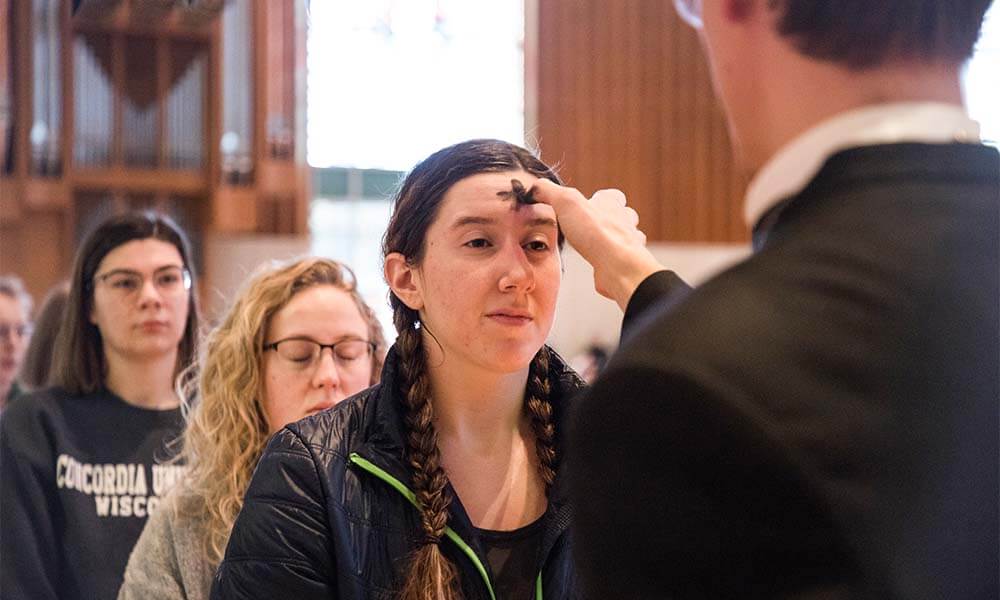
Reflections on the origins and meaning of this important holy day.
By the Rev. Dr. Jason Lane, Associate Professor of Theology
The term “Lent” comes from an Old English word “lencten,” which means “early spring.” It’s a time when the days start lengthening, when it’s time to plow the fields and sow the year’s first seeds. Our hearts are like that cold soil in early spring that cannot receive the seed of God’s life-giving Gospel unless God, the Holy Spirit, plows each of us up by His Law and prepares these icy hearts for life.
Lent is therefore a season of repentance. It’s a time to turn around, to turn away from our sinful flesh, this world, and from the devil to Jesus Christ, who came to rescue us from it all. Of course, Christians are called to do this every day. But Lent, like every season of the church year, allows us to take special time to do what we daily ought, and do it in earnest. For the forty days of Lent—an imitation of Christ’s forty days in the wilderness—we consider again His suffering for us and the cost of sin. We also learn from His suffering and death how infinitely precious we are to God. We are so precious to Him that He sent His only Son into the world to take up our nature in order to redeem lost creatures like us.
Today, Ash Wednesday, starts Lent with a stark reminder of our fallen nature: “You are dust and to dust you shall return,” as pastors place in black ash the sign of the cross upon the brows of sinners. The ash reminds us that we are like dust before the Living God, with nowhere to hide the stains of our sin. As St. Paul says, “there is no one righteous, no, not one” (Rom 3:10). So when you see administrators, faculty, staff, and students walking the halls with ashes on their forehead, we are reminded that we have no righteousness of our own, no matter who we are, from greatest to least the least. We wear the mark as a confession of our sinful nature and acknowledge together that none of us have deserved God’s mercy.
A price we could not pay
But the ash is also a reminder of something more. It is drawn upon our brows in the shape of a cross, to give glory to the Son of God who came to us “in the likeness of sinful flesh,” as if He were the sinner who needed to repent, as if He were dust to dust and we were the most precious treasures of God. He came to repent for us in dust and ashes, to take on our sin, not just on His forehead, but on His whole body, to nail it to the tree. So, again, when you see administrators, faculty, staff, and students walking the halls with ashes on their forehead, we are reminded that we, who deserved nothing but dust to dust and death, have received life by Jesus’ death; we remind each other that, because of His Son, God has not abandoned His creation to the grave. Life is ours! Encourage one another with that sacred truth.
The hard part of Lent, then, is already done. Jesus has already done it. For the sake of all humanity, He’s already gone through these forty days in the desert. He’s been tempted, and has been found faithful, so that we’d be counted faithful. That goes for our confession of sins, too. Where we’ve offered God and one another the half-ripened fruits of repentance, Jesus, the Righteous One, confessed the sins of all humanity to His Father, as if He were the only sinner. He’s done it in our place. When we’ve cuddled up to the world, Jesus has overcome it. So as we walk these forty days, let us with the Psalmist, “Sing to God, sing praises to His name; lift up a song to Him who rides through the deserts; His name is the LORD; exalt before Him.” (Ps 68:4). And now He calls sinners to follow Him in the way of the cross, to confess their sins, to get real about who we are, but most importantly, to get real about who He is, and how much He’s paid to have us as His own.
So let’s begin Lent with a prayer to start in earnest what we ought to be doing every day, knowing that God has not abandoned us, but has given Jesus for us and for our salvation and life:
Almighty and everlasting God, You despise nothing You have made and forgive the sins of all who are penitent. Create in us new and contrite hearts that lamenting of our sins and acknowledging our wretchedness we may receive from You full pardon and forgiveness; through Jesus Christ, Your Son, our Lord, who lives and reigns with You and the Holy Spirit, one God, now and forever. Amen (Collect for Ash Wednesday).
For more information on worship opportunities at Concordia University Wisconsin, visit the Campus Worship page at cuw.edu.
—
If this story has inspired you, why not explore how you can help further Concordia's mission through giving.